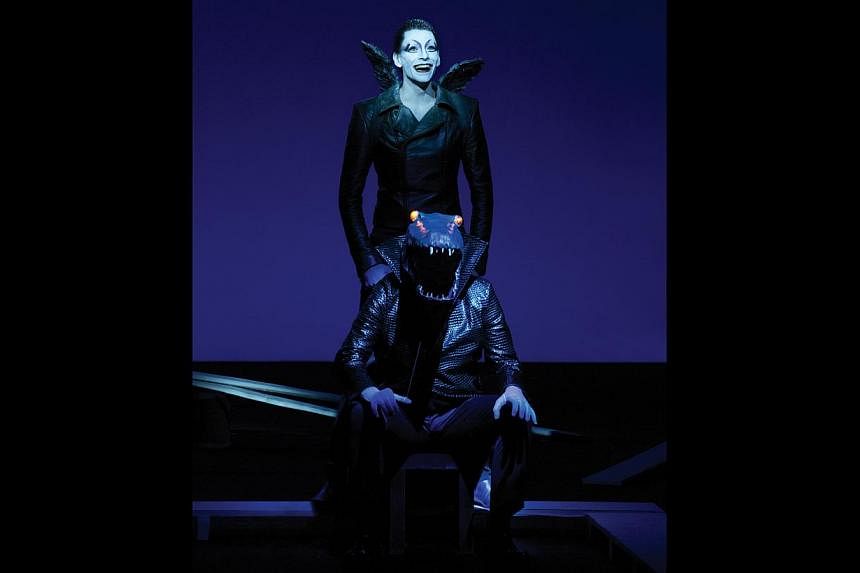Theatre director Robert Wilson turned down offers to direct Peter Pan - twice.
With his oeuvre of challenging, non-naturalistic work, it seemed that the American avant-garde giant, now 72, was not at first particularly enthralled by tales of flying children, pirates and fairies.
He tells Life!: "Some years ago, this production was offered to me and I wasn't sure it would be the right thing for me. I sort of had an idea of what it was like, knowing the Broadway production and the Walt Disney production."
He said no to that, as well as another offer by a German theatre company to do the work.
Wilson had been an assistant to the late Broadway theatre legend Jerome Robbins for nearly two years in the 1960s and Robbins had directed a famous production of Peter Pan in 1954.
But fate seemed to dictate that the winged lad and Wilson would meet. He was approached a third time, this time by Germany's Berliner Ensemble, which was founded by the influential theatre-maker Bertolt Brecht in 1949.
"I took a further look at the work and saw there were other sides to it that had been presented on Broadway and firstly in the Disney version," Wilson says.
"And I became more fascinated with the material... It has a universal story and a broad appeal. It has a mystery. And I like the fact it mixes reality and non- reality."
Wilson tends to speak in gravelly spurts, his sentences unfurling slowly and melting into one another like a gentle cascade of waves. The elusive, globe- trotting director spoke to Life! over the telephone from Estonia, where he was working on a new production with music by Arvo Part, an Estonian composer of classical and sacred music.
His darker vision of Peter Pan, the boy who never grows up, looks into the shadows of the familiar childhood fairy tale and will be staged at the Singapore International Festival of Arts from Thursday to Saturday at the Drama Centre Theatre. The production, which is sold out, promises to be a surreal visit to Neverland, with its titular character resembling cult musician David Bowie more than a winged cherub.
Wilson's production, which premiered last year in Berlin, will feature music from the inventive CocoRosie sisters, an experimental American "freak folk" band.
Claus Peymann, artistic director of the Berliner Ensemble, says in an e-mail interview with Life!: "We thought the great storyteller, magician and visionary director should for once do a work for children. What would make more sense than the world fairy tale Peter Pan? This way, what came to life was not an explicit children's play, but a fairy tale for children and adults from five to 95 years."
Wilson is no stranger to Singapore and its arts festivals. His 2000 Singapore Arts Festival commission, Hot Water, a blend of music and multimedia, was deeply polarising, as was his sprawling I La Galigo (2004) at the Esplanade Theatre, which was based on an ancient epic about the Bugis people of Sulawesi in Indonesia.
He is known as one of the United States' foremost avant-garde theatre artists and often challenges the boundaries of theatre with his minimalist style and expansive works that stretch across space and time.
Trained as an architect, he tends to piece together his productions in a very architectural way, focusing on the visual sweep of the work and allowing his cast the space to build their own emotional interiors.
He says: "I think everyone's got a secret, so I never talk to the actors about meanings.
"I give formal directions: This should be quicker, slower, more interior, more exterior, things like that - and they're free to take what they want to take and have their own ideas. Sometimes, I tell them not to insist too much on one idea so the audience can have its own idea."
And as with many of his works, his vision of Peter Pan began with his love of light: "I make sketches of light and the light creates a space. I thought of Tinkerbell as a light and it just sort of went on from there."
The same visual emphasis goes through his rehearsals as well. "I start all rehearsals with a movement first. So I staged it silently, not with text or music. I just did the movement. Then I added text and the audio score.
"So I look at it as a visual play, as a dumb play. Then, hopefully, it can stand on its own visually. Then I add the audio score and something else happens when the two are put together that wouldn't happen when the two are looked at separately or independently."
The Berliner Ensemble holds a special place in the global theatre landscape, being the flag-carrier of its founder Brecht, who introduced revolutionary theories that changed 20th-century theatre.
Brecht felt a play should not submerge a spectator so fully that he identifies emotionally with the characters on stage, but it should inspire a critical view of what was taking place as well as rational self-reflection.
To this end, one of Brecht's landmark principles was the idea of a "distancing effect" (verfremdungseffekt), where he would make use of techniques such as explanatory placards, speaking stage directions out loud, an actor addressing the audience directly - all of which have become familiar techniques in theatre today.
Peymann reaffirms that this effect is often one of Brecht's most misunderstood theories. He adds: "Theatre will not let itself be confined in a theoretical superstructure. This didn't work either for Stanislawski or Brecht, who failed with his alienation effect. There just is no one and generally binding theatre theory.
"Theatre comes to life through emotions and the heart, but not through the head. The Brechtian theory of alienation and the epic theatre is something for students, university professors and for the school curriculum. But it just won't do for the beautiful magic and the utter unpredictability of theatre art."
Wilson has collaborated with the Berliner Ensemble several times, particularly with its former head Heiner Muller. Peymann describes their relationship as "very good friends and extremely productive work colleagues".
But Wilson had no idea who Brecht was when he first started working in theatre in the 1960s.
He says: "In fact, I never studied theatre and had no idea I would ever have a career in theatre. But people told me from the beginning that obviously I had been influenced by a Brechtian way of thinking. It wasn't really true. But later when I became more familiar with his work, I could see similarities."
Wilson first studied business administration at the University of Texas from 1959 to 1962, then moved to Brooklyn where he received a bachelor's degree in architecture from the Pratt Institute in 1965.
Peter Pan will contain elements of Brecht's theatrical legacy and Wilson says it has been a challenging piece.
"We had to figure out the relationships of the parts and the characters and how they fit together, how they don't fit together, how different they are, which story does that tell - it takes some time.
"So I let things settle down and speak for themselves and try not to get anxious and not to speak to the work, but let the work speak to me."
Before he is summoned back into the rehearsal room ("Mr Wilson," someone calls in the background), the director reveals that he rarely escapes work to recharge. He says: "I just keep working. That's all. Sometimes I think it's never going to work and suddenly it does."
He recalls how he met the pioneering modern dance choreographer Martha Graham when he was 22 years old.
He says: "She said, 'So Mr Wilson, what do you want to do in life?' I said I had no idea. And she said, if you work long enough and hard enough, you'll find something. I think you're always looking - and you're always, always learning."
Follow Corrie Tan on Twitter @CorrieTan
Peter Pan is sold out.
Stepping Out To Woo Festival Audiences: See Page C6.




